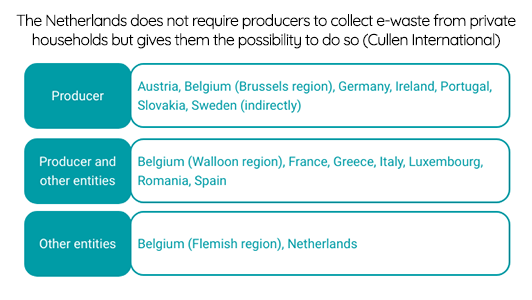Producers of electrical and electronic equipment (EEE) are regularly required to collect electronic waste (e-waste) from private households. Some member states designate this responsibility only to the producer, while other member states allow producers to share the responsibility with other entities, such as municipalities or distributors.
Member states can also require EEE producers to inform buyers of the costs of the environmentally sound collection, treatment and disposal of EEE when purchasing new products. In France, Luxembourg, Portugal and Sweden, producers share the responsibility of providing such information to buyers with other entities, such as municipalities, distributors, eco-organisations or environmental administrations.
Penalties for infringements of the national provisions on e-waste can be implemented through warnings, fines or imprisonment. In different countries and for different infringements, fines range from €100 to €5m, while imprisonment is also a possibility in Ireland and Luxembourg.

Cullen International’s new benchmark tracks the implementation of the waste electrical and electronic equipment directive (WEEE) in 14 EU member states. The benchmark focuses on requirements concerning:
- producer obligation to collect e-waste from private households;
- producer obligation to inform consumers on the collection, treatment and disposal of e-waste;
- e-waste collection rates;
- e-waste treatment;
- recovery and recycling targets; and
- penalties.
The WEEE directive aims to ensure the efficient use of resources by preventing and recovering waste from electrical and electronic equipment.
For more information on the benchmark and Cullen's complete WEEE directive coverage, please click on “Access the full content” - or on “Request Access”, in case you are not subscribed to our Sustainability service.
more news
19 January 26
Over 60 cases and counting: a snapshot of European antitrust enforcement against big tech
Our latest report provides an overview of antitrust cases brought against the largest online platform companies – Amazon, Apple, Google (Alphabet), Meta (previously Facebook) and Microsoft – by the European Commission and national competition authorities (NCAs) in Europe.
16 January 26
Cullen Digital Networks Act (DNA) Hub: 11 key takeaways from the leaked draft
The preliminary observations in this report are based on a leaked version of the draft Digital Networks Act (DNA), still subject to change, seen by Cullen International. A more comprehensive analysis will follow once the European Commission has published the final version on 20 January 2026.
12 January 26
Is IoT regulation continuing to intensify globally?
Our Quarterly Regulatory Update on IoT and M2M Services (Q4 2025) highlights how national regulators are shaping the future of IoT and M2M services in areas such as cross-border connectivity, device regulation, and security.